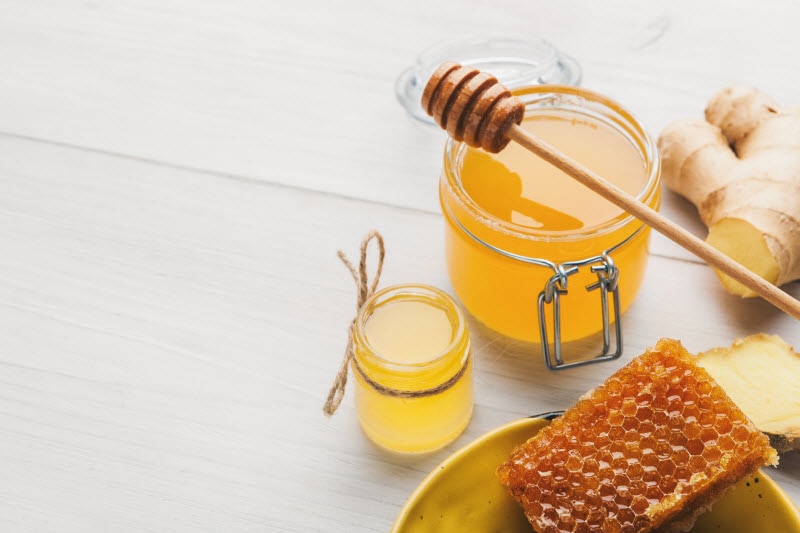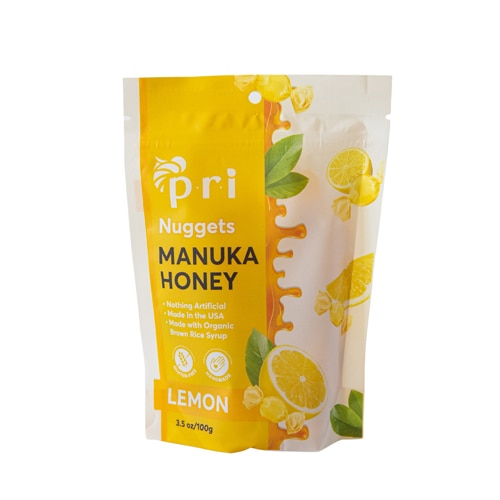[vc_row][vc_column][vc_column_text]If you have a sweet tooth, more than just your dental health is at risk.
Studies have found that
consuming too much sugar can lead to a host of health problems, including weight gain, higher blood pressure, diabetes and even heart issues.
However, a new study suggests that substituting a dollop of
honey for other sweeteners can help you get a fix of sweetness while preserving your well-being.

Consuming honey – especially when it is raw and comes from a floral source –
improves blood sugar and cholesterol readings, according to researchers at the University of Toronto.
†
Honey also may play a role in reducing some types of inflammation.
†
The researchers say they were surprised by the findings, given that honey is about 80% sugar. However, they note that honey contains elements that likely have health benefits, including:
- Both common and rare sugars
- Proteins
- Organic acids
The researchers stress that those who avoid sweeteners would do well to also skip the honey. But if you cannot live without sweet treats, honey is a good substitute for table sugar.
Emmaline Rasmussen – a registered dietitian and integrative health expert who splits her time between Los Angeles and Chicago – agrees.
“While honey is a form of sugar and should be used in moderation, it has some interesting health benefits in its raw, unheated and unpasteurized form that may make it a wise substitution for other sweeteners,” she says.
The benefits of honey
Rasmussen says consuming honey as a substitute for other sweeteners offers many potential benefits.
“Raw honey contains
antioxidants, as well as small amounts of vitamins and minerals,” she says.
Consuming raw honey might help some reduce symptoms in some people who suffer from
seasonal allergies, Rasmussen says.
†
Also, some varieties of honey -- such as
manuka honey and acacia honey -- might have antibacterial, antiviral and anti-inflammatory properties, and possibly act as digestive aids, Rasmussen says.
†
The key to getting these benefits is to consume honey raw, unheated and unpasteurized, she says. The beneficial properties of honey “degrade somewhat when honey is heated -- such as when using it in baking -- or when added to hot liquids like tea or coffee,” Rasmussen says.
Drawbacks of honey
While honey offers benefits that other sweeteners do not share, that doesn’t mean consuming a lot of honey is good for you.
“Honey is a form of added sugar, and even small amounts can quickly add up to excessive sugar intake,” Rasmussen says.
She notes that 1 tablespoon of honey contains approximately 60 calories and 17 grams of carbohydrate, with 16 grams of sugar. The primary type of sugar in honey is fructose, she adds. That is the same monosaccharide found in high-fructose corn syrup.
Not all honey is created equal, Rasmussen says. “If you aren't buying quality raw honey, you may be missing the benefits while still consuming a significant amount of fructose sugar,” she says.
Rasmussen also emphasizes that honey should never be given to infants 12 months of age or younger, due to the risk of infant botulism.
Adding more honey to your diet
Like the University of Toronto researchers, Rasmussen advises against consuming honey simply to try to boost your health.
“Rather than increasing sugar intake by adding honey in addition to the sugar in a person's diet, I instead suggest replacing other sweeteners with honey,” she says.
An example of this is to skip buying sweetened yogurts and instead opt for plain, unsweetened Greek yogurt that you top off with raw honey.
Honey also can be used in place of sugar in coffee or
tea as well, Rasmussen says. If you choose this option, wait to add the honey until the beverage has cooled slightly and you are about to drink it.
Doing so can “protect as many of the health-promoting qualities as possible,” she says.
†These statements have not been approved by the Food and Drug Administration. These products are not intended to diagnose, treat, cure or prevent disease.[/vc_column_text][/vc_column][/vc_row][vc_row][vc_column][vc_text_separator title="Featured Products" border_width="2"][vc_row_inner equal_height="yes" content_placement="middle" gap="35"][vc_column_inner width="1/3"][vc_single_image image="164011" img_size="full" alignment="center" onclick="custom_link" img_link_target="_blank" css=".vc_custom_1671573736613{padding-right: 7% !important;padding-left: 7% !important;}" link="https://www.vitacost.com/honey-gardens-wildflower-raw-honey"][/vc_column_inner][vc_column_inner width="1/3"][vc_single_image image="164012" img_size="full" alignment="center" onclick="custom_link" img_link_target="_blank" css=".vc_custom_1671573754224{padding-right: 7% !important;padding-left: 7% !important;}" link="https://www.vitacost.com/pri-manuka-honey-sticks#recipes"][/vc_column_inner][vc_column_inner width="1/3"][vc_single_image image="164013" img_size="full" alignment="center" onclick="custom_link" img_link_target="_blank" css=".vc_custom_1671573769773{padding-right: 7% !important;padding-left: 7% !important;}" link="https://www.vitacost.com/simple-truth-organic-raw-manuka-honey-with-65-minimum-pollen-count"][/vc_column_inner][/vc_row_inner][/vc_column][/vc_row]
 Consuming honey – especially when it is raw and comes from a floral source – improves blood sugar and cholesterol readings, according to researchers at the University of Toronto.†
Honey also may play a role in reducing some types of inflammation.†
The researchers say they were surprised by the findings, given that honey is about 80% sugar. However, they note that honey contains elements that likely have health benefits, including:
Consuming honey – especially when it is raw and comes from a floral source – improves blood sugar and cholesterol readings, according to researchers at the University of Toronto.†
Honey also may play a role in reducing some types of inflammation.†
The researchers say they were surprised by the findings, given that honey is about 80% sugar. However, they note that honey contains elements that likely have health benefits, including:



